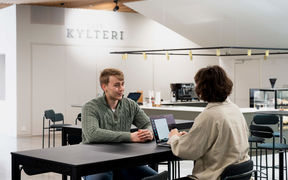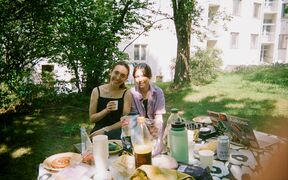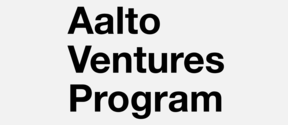Aalto Ventures Program
The program prepares students for high-growth entrepreneurship through top-level education and curricular activities.

Today’s complex problems require expertise, dedication and heart. In response, the Masters’ Programme in Sustainable Entrepreneurship aims to build the next generation of sustainable leaders – a generation committed both to positive social and environmental impact and to economic prosperity.
The business world is moving towards a more holistic approach to entrepreneurship that emphasises adding value to society. Trained professionals who can effectively transition existing business processes and develop sustainable solutions through corporate, public, and startup entrepreneurship are in high demand. This makes sustainable entrepreneurship a promising career path where you can make a profound impact on both the environment and society.
Whether you envision yourself as a budding founder, startup executive, or corporate innovator, our programme provides a comprehensive, individually tailored curriculum to prepare you for the rapidly evolving landscape of sustainable business. Graduates will be able to:
Sustainable entrepreneurs like you will face the challenge of maintaining profitability while addressing large-scale societal issues. This degree programme will give you the tools to do just that. Become a part of the solution to some of the world's most pressing problems!
The language of instruction is English.
The tuition fee for this programme is 15 000 euros per academic year. Citizens of European Union (EU), the European Economic Area (EEA) or Switzerland do not pay tuition fees. Citizens of other countries must pay tuition fees.
Aalto University offers a small number of scholarships in the form of tuition fee waivers to fee-paying students. Scholarships can be awarded to the highest-achieving applicants based on the programme's evaluation criteria. Applicants are ranked according to the criteria outlined on the programme's webpage.
More information on tuition fees and scholarships at Aalto University is available at the Scholarships and Tuition Fees webpage.
Sustainable Entrepreneurship is organised by the School of Business and comprises a total of 120 ECTS credits. The two-year programme consists of:
Students have the opportunity to complete their minor studies at an official exchange programme partner of the School of Business.
Minor studies are a structured, self-selected set of courses that add breadth and multidisciplinarity to your educational experience. Elective studies allow you to personalise your education in sustainable entrepreneurship. (Elective courses are listed below.).
At the beginning of your studies, you’ll define your Personal Study Plan (PSP) together with an academic advisor. The primary purpose of your PSP is to ensure that the studies support your interests and are completed in a logical order.
Key courses in the programme include (but are not limited to):
There are two tracks offered in the Sustainable Entrepreneurship degree programme. Each represents a different facet of sustainable entrepreneurship, and the ability to choose between them – or carve out a personalised path – is what makes this programme different.
Sustainable startup track. For those who want to become entrepreneurial leaders interested in taking a wider view of startup value creation.
Sustainable corporate entrepreneurship track. For future intrapreneurs who want to practise entrepreneurial behaviour to drive positive change and innovation within established businesses. Interested in corporate entrepreneurship? Define your own path through courses in accounting, product development, project management, marketing, HR, and more.
In practice, these degree tracks are based on elective courses and serve only as a guide – you’re free to craft your personal study plan to create your own unique path.
The Sustainable Entrepreneurship programme lends itself to an international, multidisciplinary study experience. In it, you will be able to develop your global competence in a variety of ways – spending a semester abroad or maybe taking a summer course at one of Aalto University’s partner schools around the globe.
If you’re interested in deepening your knowledge in a specific area, you can take your minor while on an exchange, tailoring your study path to fit your personal interests and career goals. Some students even carry out their practical training, internships, or master’s thesis research abroad.
If you’d rather stay a bit closer to home, the programme will also welcome visiting lecturers and speakers from abroad, who will bring their diverse perspectives and insights into our classrooms.
The degree grants eligibility for doctoral studies.
This programme prepares professionals for a meaningful and sustainable business career, with the opportunity to work on large-scale world challenges. Graduates can work as entrepreneurs, sustainability specialists at established companies, as policy advisors, and much more. Here are a few typical examples:
Aalto University’s Entrepreneurship Unit (ENTU) houses top experts in the field, and spanning a range of industries. Our faculty’s research focus lies at the crossroads of entrepreneurship and sustainability. The topics we study include sustainable entrepreneurship, social entrepreneurship, (e.g. organising in response to disasters, refugee crises and other large-scale challenges), impact investing, well-being in entrepreneurship, and more.
And you will have the opportunity to shape the research direction of the field through your selected thesis topics.
We also work closely with the Department of Industrial Engineering and Management (DIEM), whose research focuses on strategy and venturing, operations and service management, and entrepreneurial leadership.
The Sustainable Entrepreneurship programme is a hub of expertise, with a curriculum built through active collaboration between:
Within the programme, a project-based courses might involve collaboration with government organisations or outside corporations. You can also supplement your studies with courses from other Aalto schools, programmes, and majors – or even with courses offered by other universities.
Hear more about School of Business' new master's programme, Sustainable Entrepreneurship! The teachers and admissions staff present the programme and answer questions about content, applying and more.

Curious about life at Aalto University? Chat with Aalto students and join them for virtual Coffee sessions every Friday!

Applicants meeting Aalto’s general eligibility criteria for master's studies are evaluated and ranked according to the evaluation criteria decided in advance for each study option.
The applications to Master’s Programme in Sustainable Entrepreneurship are evaluated based on the following criteria.
| Academic performance | |
| What is evaluated? | Grades of the previous degree(s) |
| Admission requirements | Weighted GPA of previous degree and overall evaluation of study success. Applicants with a weighted GPA of previous degree lower than 3.50 are not eligible for admission. |
| Evaluated documents | Transcript(s) of records, degree certificate(s) |
| Criticality | Critical (0 points = rejection) |
If your previous studies were completed in an institution that uses another scale than the ECTS, you need to attach an informal description regarding the credit and grading scale to the application.
| Suitability | |
| What is evaluated? | Motivation letter, CV |
| Admission requirements/What we look for in an applicant |
The needed documents are 1) motivation letter and 2) the applicant’s CV, both written in English. There are four questions for the motivation letter; yet, the applicants are encouraged to not feel restrained by these guiding questions:
The motivation letter will be a maximum of 1200 words, including a 200 word summary and a 1000 word ‘main’ section CVs will be a maximum of two pages, highlighting most relevant experiences and skills. Applicants selected to the interview phase will receive further information of the format and schedule of the interviews after the initial evaluation. |
| Evaluated documents | Motivation letter, CV |
| Criticality | Critical (0 points = rejection) |
Phase 2
| Suitability | |
| What is evaluated? | Interview |
| Admission requirements | Interviews will be carried out online in English. The interview panel will assess the applicant’s suitability to the study option based on general cognitive ability, critical thinking skills, learning orientation, pro-social orientation and communication skills. |
| Evaluated documents | Interview |
| Criticality | Critical (0 points = rejection) |
| Academic performance | |
| What is evaluated? | Grades of the previous degree(s) |
| Admission requirements | Weighted GPA of previous degree and overall evaluation of study success. Applicants with a weighted GPA of previous degree lower than 3.50 are not eligible for admission. |
| Evaluated documents | Transcript(s) of records, degree certificate(s) |
| Criticality | Critical (0 points = rejection) |
If your previous studies were completed in an institution that uses another scale than the ECTS, you need to attach an informal description regarding the credit and grading scale to the application.
| Standardized tests | |
| What is evaluated? | Analytical and quantitative skills |
| Admission requirements | GMAT or GRE is obligatory in admission group 2 (minimum score 550 in GMAT, 515 in GMAT Focus edition or GRE score of 154 verbal reasoning - 155 quantitative reasoning). |
| Evaluated documents | GMAT/ GRE test results |
| Criticality | Critical (0 points = rejection) |
| Suitability | |
| What is evaluated? | Motivation letter, CV |
| Admission requirements/What we look for in an applicant |
The needed documents are 1) motivation letter and 2) the applicant’s CV, both written in English. There are four questions for the motivation letter; yet, the applicants are encouraged to not feel restrained by these guiding questions:
The motivation letter will be a maximum of 1200 words, including a 200 word summary and a 1000 word ‘main’ section CVs will be a maximum of two pages, highlighting most relevant experiences and skills. Applicants selected to the interview phase will receive further information of the format and schedule of the interviews after the initial evaluation. |
| Evaluated documents | Motivation letter, CV |
| Criticality | Critical (0 points = rejection) |
Phase 2
| Suitability | |
| What is evaluated? | Interview |
| Admission requirements | Interviews will be carried out online in English. The interview panel will assess the applicant’s suitability to the study option based on general cognitive ability, critical thinking skills, learning orientation, pro-social orientation and communication skills. |
| Evaluated documents | Interview |
| Criticality | Critical (0 points = rejection) |
The academic evaluation for the Master’s Programme in Sustainable Entrepreneurship is done based on the following programme-specific documents:
Please also remember to check the general document requirements for all master’s applicants.

The program prepares students for high-growth entrepreneurship through top-level education and curricular activities.

Behind Aalto's entrepreneurship and innovation ecosystem are both student-led entrepreneurial activities and the university's own research and innovation hubs.
School of Business
In case of programme-specific questions and inquiries, please contact the School of Business.
programmes-biz@aalto.fi
Aalto University Admission Services
If you have any questions regarding the application process, application documents or language tests, please contact Aalto University Admission Services.
admissions@aalto.fi